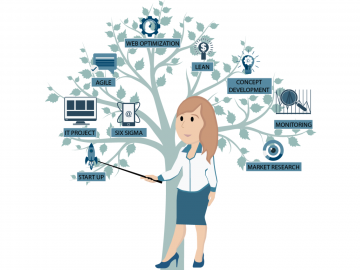Program #1
Target Audience: project managers
Duration: 2 days.
Learning Objectives:
- Structify and systematize knowledge in the field of project management in accordance with international project management standards.
- To teach the key skills of initiating, planning, implementing, monitoring and closing projects.
Thematic plan
- Project management basics
- Project characteristics, the concept of the "project triangle", types of projects, programs and project portfolios.
- Project management, root causes of project failure, key success factors for projects.
- Project management knowledge areas, project management standards.
- Project Life Cycle
- Project Initiation Phase
- Project stakeholders, identification and analysis of stakeholders.
- Project team, project manager, key roles in the project.
- Requirements management.
- Project charter, contents of the project charter.
- Project scope management, project cost estimation.
- Project Planning Phase
- Structural decomposition.
- Methods for estimating project parameters.
- Network diagram, scheduling, task node, types of logical links of project activities, critical path.
- Gantt chart, responsibility allocation matrix.
- Resource usage optimization, project costing.
- Risk and incident management.
- Communication and quality management
- Project Implementation Phase
- Project control system.
- Principles of forming a project team: team roles, stages
- team development.
- Project monitoring and control, types of monitoring and control, earned value method.
- Control changes in the project.
- Motivating project teams and influencing stakeholders.
- Project close phase
- End and close the project.
- After Action Review method.
- Learning Analysis
- Problem analysis and decision making in a Pinpoint team.
- Creating an action plan to improve the efficiency of the project team.
- Retrospective planning
Teaching technology:
- In the learning process, practical tools are given - techniques, technologies, methods for effective project management.
- Each thematic block is supported by examples from practice, consolidating the material with a practical exercise.
- The result will be the development of project management skills in accordance with international project management standards.
- Classes include individual exercises and group tasks.
Developed competencies:
- Result Oriented
- Project management
- Team Management
As a result of the training, participants will learn:
- Understand design thinking and the project life cycle.
- Modern project management tools.
- Effectively manage the activities of the project team.
- Properly formulate the goals and results of the project.
- Effectively plan and prioritize project management.
- Identify risks and problems of the project, eliminate them.
- Work to improve your project management skills.
Methodology for building a training session
- The training is conducted in the mode of intensive interactive interaction between the facilitator and participants.
- The training program uses mini-lectures, discussions, training exercises, role-playing and business games, individual tasks and tests to develop the necessary skills.
- Participants receive an overview of the theory from the trainer, followed by mandatory practice of specific skills that can be used in their work.
- For effective assimilation of the material, participants receive Workbooks.
Program #2
Training Goal: To offer seminar participants a systematic approach to project planning and organization.
Duration: 1 day.
Thematic plan:
1. The place of the project in management
Purpose of the project
(solving a problem or using a new feature).
Project definition.
Key concepts:
– classification of projects,
– project stages,
– the main factors for the successful implementation of the project,
– methods of evaluating a project.
Benefits of a systematic approach to project planning and organization.
2. Planning
The appearance of the project
(2 strategies for setting the goal(s) of the upcoming project and choosing a solution):
– goal setting technique (SMART goals or 5K rule),
– problem – goal – solution,
– opportunity – goal – solution.
3. Organization
Definition of org chart:
– project administrator,
– design team.
Creating a feedback system.
Effective business communication.
All sections of corporate trainings..>
The training program is basic and can be adjusted to the specifics of your business.
If you did not find a suitable option on the site, please contact us and we will develop any training program for you.
You can contact us in any way convenient for you


















































